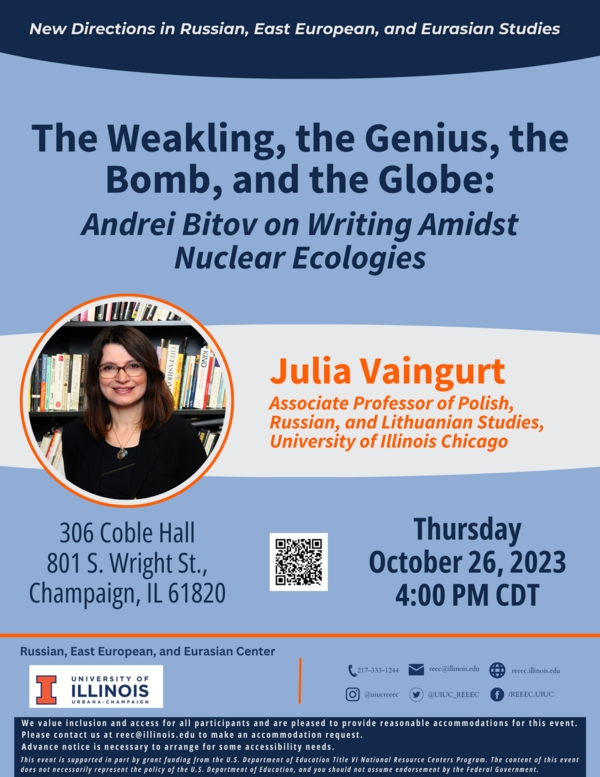REEEC New Directions Lecture: Julia Vaingurt, "The Weakling, the Genius, the Bomb, and the Globe: Andrei Bitov on Writing Amidst Nuclear Ecologies"

- Sponsor
- REEEC
- Speaker
- Julia Vaingurt (Associate Professor and Director of Graduate Studies in Polish, Russian, and Lithuanian Studies, University of Illinois Chicago)
- Cost
- Free and open to the public.
- Contact
- REEEC
- reec@illinois.edu
- Views
- 283
- Originating Calendar
- Russian, E. European & Eurasian Center: Speakers
The talk will explore Andrei Bitov’s creative struggles—his own writer’s block and existence at loose ends, and that of his characters—as a response to the threat of nuclear annihilation, and as a sign of preoccupation with ecological and ontological finitude. Bitov’s continuous questioning of how to live, write, and relate to the world under conditions of universally shared vulnerability are particularly relevant today. In an attempt to solve the predicament of writing under the threat of nuclear annihilation, Andrei Bitov oscillates between two diametrically opposite manifestations of writerly weakness: writer’s block and graphomania. Bitov’s protagonists fill innumerable pages describing their writer’s block. This weakness is a result of eschatological thinking: persistent thought of the end places the possibility of human agency—hence the efficacy or necessity of any creative act—in grave doubt. Bitov is often read as a Christian thinker, yet his awareness of the ultimate end is burdened by the secularism of his catastrophic imagination. Bitov’s writer-character finds himself in a peculiar position, both affirming, and recognizing the harm of, the creative personality’s recognition that he or she can do nothing to avert humanity’s inexorable self-destruction. As Bitov’s protagonists are torn between two opposing dictums (one that calls for the wisdom of weakness, the other for the delusion of agency), his texts continue to search for a solution to the postmodern problem of futurity. Time and again he returns to the figure of a demiurgic genius who just might succeed in becoming both immanent and transcendent, overcoming the limitations of ordinary human life, and enduring beyond the end. Ultimately, Bitov concludes that genius consists in affirming discontinuous continuity—be it in the form of a halting writing, partial understanding, cautious making, or provisional (tentative) living—as both the only feasible and the only ethical mode of being in the world. Bitov’s idea of discontinuous continuity offers a new inflection of ecological thought.
Julia Vaingurt is Associate Professor in the Department of Polish, Russian, and Lithuanian Studies at the University of Illinois at Chicago. She is the author of Wonderlands of the Avant-Garde: Technology and the Arts in Russia of the 1920s (Northwestern UP, 2013) and a co-editor of The Human Reimagined: Posthumanism in Russia (Academic Studies Press, 2018). Her scholarship investigates the aesthetics and ethics of science and technology, including bioethics, biopolitics, and bioengineering. She has recently completed a book manuscript, Soft Matter: The Poetics of Weakness in Late Soviet Socialism, and is currently working on a series of articles about the relationship between epidemiology and literature.